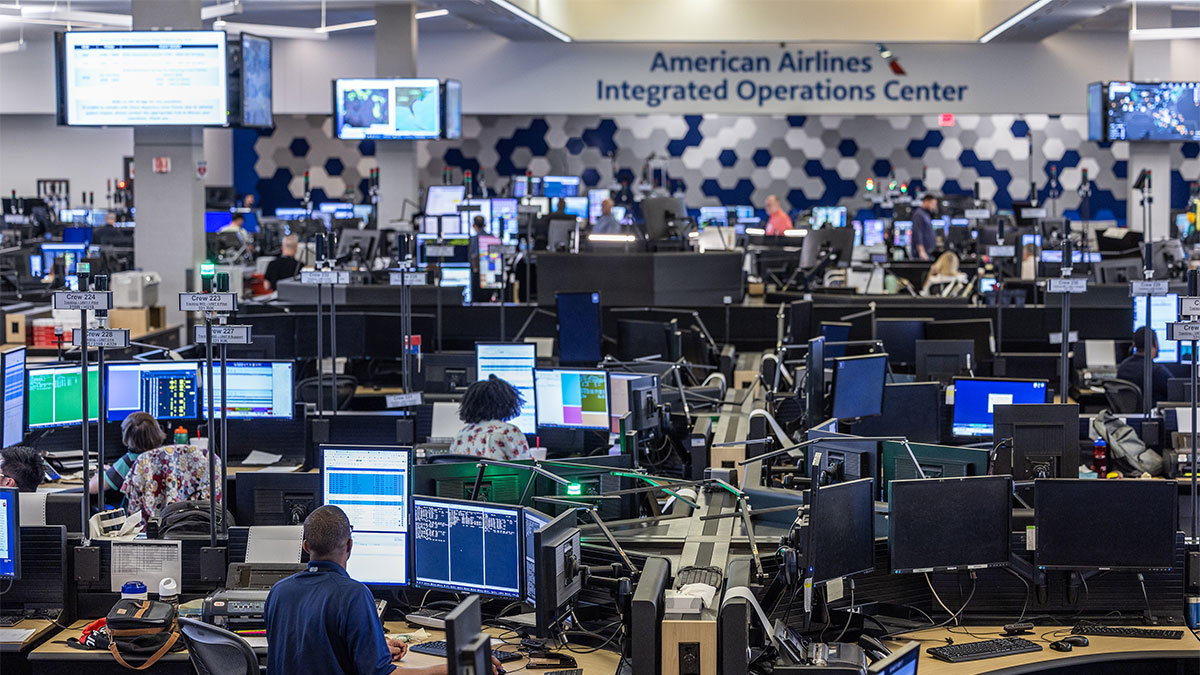NORTHAMPTON, MA / ACCESSWIRE / July 1, 2024 / Like the conductor of an orchestra, Ron Erdmann leads a closely coordinated team of professionals. But instead of music, Ron is conducting American's Boeing 777 operation on a recent afternoon.
Ron, a 35-year veteran of the airline, is an operations coordinator based at American's Integrated Operations Center (IOC) in Fort Worth, Texas. Before him is a three-dimensional puzzle that's playing out across five continents: the 67 777s in American's fleet and the backbone of the airline's long-haul operation.
At his side are the three other members of his unit: senior aircraft router Matt Hair, who looks after the aircraft themselves; crew coordinator Tiffany Gray-Coleman, who ensures the aircraft have crews available for their flights; and system customer service manager Robert Thornhill, who looks after customers.
Think of these units as teams of problem solvers who are committed to getting customers, team members and aircraft on their way when they're thrown operational curveballs - and looking ahead to prevent issues from getting worse - or appearing altogether.
"An ounce of prevention goes a long way for our operation," Ron said.
Saving the day for our customers
IOC units like the 777 unit - one of 11 in the building - are known to devise creative solutions when needed to save the day for American's customers.
Take the time that a group of 54 customers traveling from Sao Paulo, Brazil (GRU), to Orlando, Florida (MCO), were going to misconnect at American's Miami (MIA) hub. In the unit, the system customer service manager worked closely with the ops coordinator to develop a solution that allowed American to fly the large group to MCO on the same day. The solution? Creating an additional flight that's known as an extra section.
The maintenance router found an available aircraft at MIA that could accommodate the group, while the crew coordinator found a crew that could staff the flight. The plan worked, and other customers were even able to take advantage of this extra section. Had it not worked, the group would have had to remain in MIA overnight and would have likely been separated as they made their way to MCO.
Recently, the Boeing 787 unit worked together to race a line of weather that was about to impact American's Chicago (ORD) hub and a critical ORD-London Heathrow (LHR) flight that was scheduled to arrive close to the airport's curfew time. The unit coordinated a 15-minute early departure that allowed the aircraft to beat the weather and avoid a lengthy delay of at least 8 hours. To make this plan work, the crew coordinator worked to ensure the crew knew of the earlier time and the system customer service manager worked to ensure that there were no tight inbound connections that could be jeopardized by the earlier departure time.
A day in the life
That afternoon, the 777 unit with Ron, Robert, Matt and Tiffany looked after American's customers - and operation - in a number of ways:
The team proactively looked at opportunities to swap aircraft - switching one aircraft's flight assignment for another - to help keep the operation on track. For instance, Matt and Ron proactively looked at the estimated arrival times for different 777 aircraft at London Heathrow (LHR) the following morning and made these swaps to maximize the time between flights, which helps ensure on-time departures.
A medical diversion saw the unit do two things: work to ensure a customer requiring medical attention was getting the necessary care on the ground and devising a plan for the flight to continue to its destination, which it did after the quick diversion.
Throughout the shift, Ron was looking at the big picture, while Robert was looking out for the customers, Matt was ensuring that aircraft were being sent on the correct flights and Tiffany was looking out for crew issues, ensuring flights were staffed with crew who could operate them.
The unit makes decisions with American's customers in mind and collectively looks after customers across more than 6,000 flights and 1,500 aircraft a day. Safely solving for the customer - and American's system - is the main goal. Whether it's devising an operational plan when a customer has a medical emergency or helping to restart the operation after severe weather impacts a hub, the IOC unit is there to help solve any problems that may arise, day and night.

View additional multimedia and more ESG storytelling from American Airlines on 3blmedia.com.
Contact Info:
Spokesperson: American Airlines
Website: https://www.3blmedia.com/profiles/american-airlines
Email: info@3blmedia.com
SOURCE: American Airlines
View the original press release on accesswire.com
